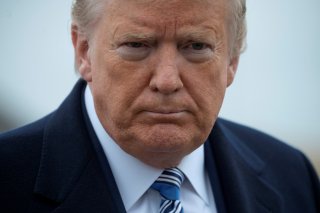Donald Trump's Wise Coronavirus U-Turn Was the Right Call
Considering the costly delay in formulating a coherent coronavirus policy response, it would be a stretch to say that all is well that has ended well. However, we can at least say that matters could have been a lot worse both economically and socially had Mr. Trump not wisely made the U-turn in fighting this epidemic that he now seems to have made.
Winston Churchill famously said that one could always count on the Americans to do the right thing after they had tried everything else.
So it seems to have been the case with America’s response to the coronavirus epidemic. After having toyed with a variety of alternatives, America has stumbled on what seems to be the right set of policy decisions. Namely, it has now extended the period of social distancing at least till the end of April to limit the epidemic’s spread. It has also adopted a bold and far-reaching fiscal policy package in order to mitigate the serious social and economic fallout from a prolonged period of social distancing.
Among the most inexcusable and damaging US policy decisions taken in response to the coronavirus epidemic were those at its onset. Despite the clearest of early warning signs from China, Italy, and Spain, the Trump Administration dismissed calls for immediate preventive action. It did so in the mistaken belief that the coronavirus epidemic would be no more lethal or disruptive in the US than the flu epidemics to which long since we had become accustomed.
Similarly in the epidemic's initial phase, the Trump administration chose to ignore the devastating economic effect that the coronavirus crisis was having on China, Italy, and Spain. Instead, it continued to trumpet the inherent strength of the US economy and it clung to the mistaken belief that the US could avoid an economic recession.
The Trump Administration’s unrealistic hopes about limited health and economic fallout from the coronavirus crisis were soon mugged by reality.
It soon became apparent that failure to act early to prevent the virus’s spread put a city like New York on the same disastrous trajectory as a country like Italy. Similarly, once both US equities went into free fall and credit conditions began to tighten, it did not take long for the Washington consensus view on the economy to shift dramatically. No longer was it believed that the US would avoid an economic recession. Rather, it was quickly realized that the US and the global economies were more than likely to experience a deeper economic recession than that experienced in 2008-2009 in the wake of the Lehman bankruptcy.
As the economic and social costs of the coronavirus epidemic became apparent--with US unemployment increased by more than 3 million workers in a single week--Congress sprang to action with unprecedented speed and boldness. It did so by adopting in a bipartisan fashion a US$2 trillion fiscal stimulus package making it by far the largest peacetime such effort. In addition to providing generous unemployment compensation, it also included measures to forestall a wave of corporate bankruptcies as well as measures to incentivize small and medium-sized companies to hold onto their employees.
At the same time, recognizing that keeping people at home to contain the epidemic’s spread could precipitate the deepest of economic recessions, Mr. Trump toyed with the idea of abandoning the social distancing policy in place by as soon as April 12. He did so in the mistaken belief that there was a real choice between saving lives and saving the economy.
Fortunately, as Winston Churchill might have predicted, in the end, America has landed up doing the right thing after having toyed with doing everything else. It did so after Mr. Trump listened to his health advisors. They warned that without a social distancing policy the coronavirus epidemic could very well cost 2 million American lives, while with such a policy the losses could be limited to between 100,000 to 200,000 lives.
America also did the right thing after Mr. Trump wisely realized that there was a false trade-off between saving lives and saving the economy. In particular, he realized that getting people back to work quickly would only temporarily boost output and would set up the stage for a renewed and prolonged period of economic weakness. It would do so by heightening the rapidity and the virulence with which the virus would spread. As Bill Gates aptly put it, it’s very tough to say to people, ‘Hey, keep going to restaurants, go buy new houses, ignore that pile of bodies over in the corner’.
Considering the costly delay in formulating a coherent coronavirus policy response, it would be a stretch to say that all is well that has ended well. However, we can at least say that matters could have been a lot worse both economically and socially had Mr. Trump not wisely made the U-turn in fighting this epidemic that he now seems to have made.
Desmond Lachman is a resident fellow at the American Enterprise Institute. He was formerly a deputy director in the International Monetary Fund's Policy Development and Review Department and the chief emerging market economic strategist at Salomon Smith Barney.

